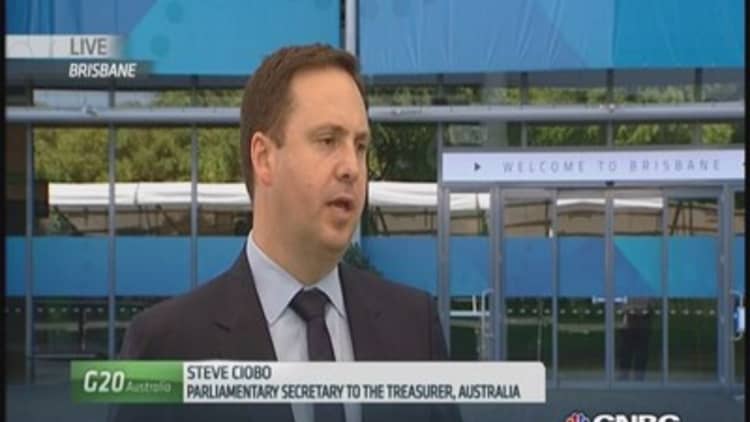World leaders will gather in Brisbane, Australia for this weekend's G-20 Leaders' Summit, where addressing global growth challenges in focus as the group's goal of boosting collective gross domestic product (GDP) by 2 percentage points over five years looks ever more distant.
Seven thousand delegates will attend the November 15-16 meeting. The 20 nations account for around 80 percent of global GDP, more than 75 percent of global trade, and two-thirds of the world's population, according to Reuters.
"This weekend's summit should end with pledges by individual G-20 governments to implement reforms designed to boost growth. Even if little of this is new, the focus on growth is preferable to the wrangles over fiscal and monetary policy that have marred many previous gatherings," said Andrew Kenningham, senior global economist at Capital Economics.
In February, G-20 leaders vowed to boost collective GDP by an additional 2 percentage points by 2018 – an ambition that appears increasingly challenging as members from Japan and China to Germany and Russia witness slowing growth.
Read More
The key objective for Australia, which holds the G-20 Presidency this year, is to reach an agreement on reforms that will lift the G-20's collective GDP, said Kenningham, in areas such as infrastructure spending, competition policy and the labor market.
"Most do not really require international cooperation, but they are at least important in their own right and they are an attempt to address the key challenge currently facing the world economy," he said.
Beyond the growth agenda, there will be discussions on addressing inequality, climate change, closing international loopholes and Ebola, say analysts.
Read More
There are expectations the G-20 may endorse plans to establish a fund to fight future pandemics, for example.
Trade talks
Hopes for a breakthrough in negotiations over international trade look misplaced, said Kenningham.
"Admittedly, the U.S. midterm elections may lead to President Obama being granted 'fast-track' negotiating authority by Congress, and he has recently encouraged leaders of the twelve countries involved in the Trans-Pacific Partnership (TPP) talks to finalize this agreement as soon as possible," he said.
The TPP, which would span from Asia to the Americas and cover 40 percent of the world economy, is a key facet of the U.S. effort to strengthen ties with Asia amid China's rise.

"But in our view, it still looks unlikely that there will be a major trade agreement before the 2016 U.S. Presidential elections," he added.
Geopolitical flashpoints
The meeting takes place against the backdrop of simmering political tensions with "a significant buildup" Russian forces in Ukraine this week, according to a report by North Atlantic Treaty Organization (NATO).
"There is a risk that domestic economic problems will tempt President Putin to escalate the conflict in Ukraine, or even in the Baltic states, as a distraction. If so, the West would presumably ratchet up sanctions, dealing a further blow to the Russian economy," Kenningham said.
Read MoreWhich world leader gets best hotel room?
With geopolitical flashpoints looming large, it would not be surprising if the group struggles to make any major breakthroughs, he said.
Aaron Connelly, research fellow at the Lowy Institute for International Policy isn't holding his breath either.
"We've seen a lot of announcements earlier in the week [out of APEC] and I'm not sure we're going to see a lot of announcements this weekend," he said. The Asia-Pacific Economic Cooperation summit yielded a historic climate change pact between the U.S. and China. The world's two biggest economies also struck a deal on eliminating duties on IT products.
Nevertheless, it's an important summit from Australian Prime Minister Tony Abbott's perspective in terms of demonstrating the country can play a leadership role in the region.


